Forest Service decision on the Jazz Timber Sale dismisses public concern
Update on the Forest Service's recent decision to proceed with the 2,000 acre Jazz Timber Sale.

The Forest Service issued its final decision on the Jazz Timber Sale on September 7th, 2012, finding that the 2,000 acre logging project would have “No Significant Impact” on the environment. This decision signals the Forest Service’s intent to proceed with Jazz as planned, despite overwhelming opposition from the public. Bark intends to appeal the decision.
While nearly 3,000 individuals provided public comment in opposition to the Jazz Timber Sale, the Forest Service has decided not only to proceed with Jazz, but the only change they made was to increase the amount of heavy thinning to “create elk habitat." While couched as a “thinning sale”, the project would create 20 new logging landings, each of which is a small clearcut area, and have almost 50 skyline yarding corridors - 15 foot clearcut strips through “no-cut” buffer in Riparian Reserves.
Additionally, the agency cannot ensure that logging companies follow “Best Management Practices” to mitigate the impacts of logging (as Bark has found in its recent post-logging monitoring), despite deferring to these BMPs as the primary method to mitigate the impacts of the sale. To make matters worse, the BMPs in Jazz are much weaker standards than those in other recent sales in the Clackamas River Ranger District.
The Forest Service has already “jumped the gun” – in July they logged a decommissioned road, before any decisions have been made about whether or not to re-open the road. This is only one of 12 miles of decommissioned roads that would be reconstructed, and then re-decommissioned, at a cost of nearly $300,000. To add insult to injury, this entire project is being billed as forest restoration.
Bark Groundtruthers spent over 600 hours surveying the proposed Jazz Timber Sale and documenting concerns ranging from an abundance of streams and other riparian areas in logging units, impacts to the Collowash River Watershed, threats to salmon population, and a high density of landslides and unstable soil in the project area. Bark intends to hold the agency accountable to its own public process to ensure that the concerns raised by thousands are incorporated, not dismissed.
We are reviewing the Forest Service’s decision and will be evaluating our next moves to stop this massive logging project from going forward.
You can take action today by contacting your congressperson to express your frustration with the Forest Service approval of this project: http://salsa.democracyinaction.org/o/1810/p/dia/action/public/?action_KEY=11695
While nearly 3,000 individuals provided public comment in opposition to the Jazz Timber Sale, the Forest Service has decided not only to proceed with Jazz, but the only change they made was to increase the amount of heavy thinning to “create elk habitat." While couched as a “thinning sale”, the project would create 20 new logging landings, each of which is a small clearcut area, and have almost 50 skyline yarding corridors - 15 foot clearcut strips through “no-cut” buffer in Riparian Reserves.
Additionally, the agency cannot ensure that logging companies follow “Best Management Practices” to mitigate the impacts of logging (as Bark has found in its recent post-logging monitoring), despite deferring to these BMPs as the primary method to mitigate the impacts of the sale. To make matters worse, the BMPs in Jazz are much weaker standards than those in other recent sales in the Clackamas River Ranger District.
The Forest Service has already “jumped the gun” – in July they logged a decommissioned road, before any decisions have been made about whether or not to re-open the road. This is only one of 12 miles of decommissioned roads that would be reconstructed, and then re-decommissioned, at a cost of nearly $300,000. To add insult to injury, this entire project is being billed as forest restoration.
Bark Groundtruthers spent over 600 hours surveying the proposed Jazz Timber Sale and documenting concerns ranging from an abundance of streams and other riparian areas in logging units, impacts to the Collowash River Watershed, threats to salmon population, and a high density of landslides and unstable soil in the project area. Bark intends to hold the agency accountable to its own public process to ensure that the concerns raised by thousands are incorporated, not dismissed.
We are reviewing the Forest Service’s decision and will be evaluating our next moves to stop this massive logging project from going forward.
You can take action today by contacting your congressperson to express your frustration with the Forest Service approval of this project: http://salsa.democracyinaction.org/o/1810/p/dia/action/public/?action_KEY=11695
More about Jazz...




